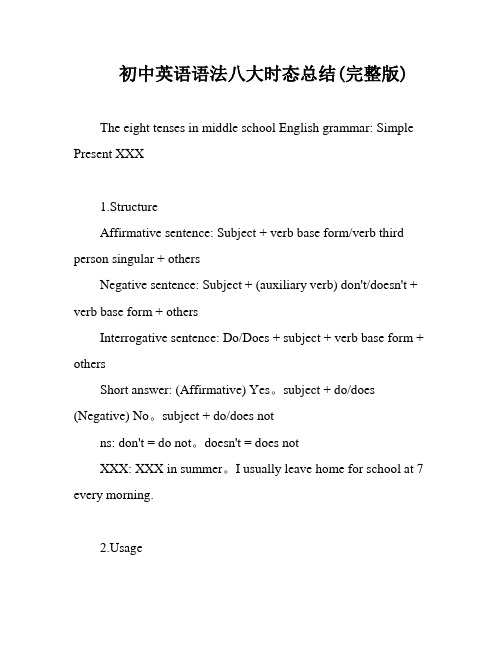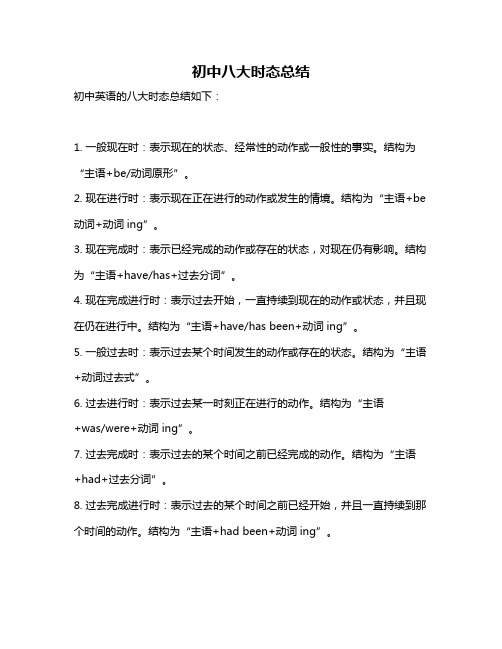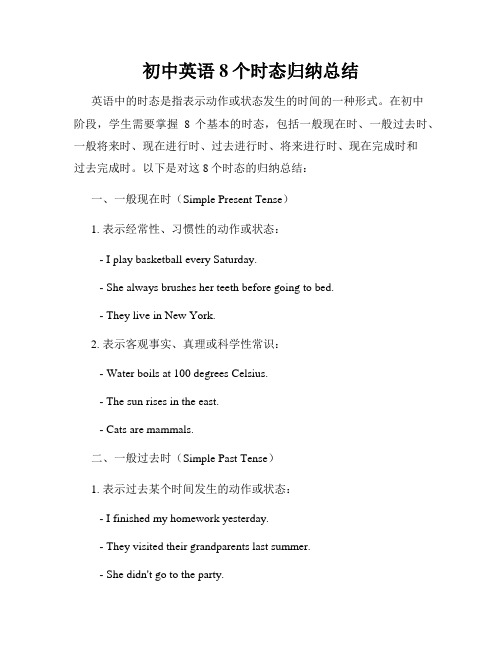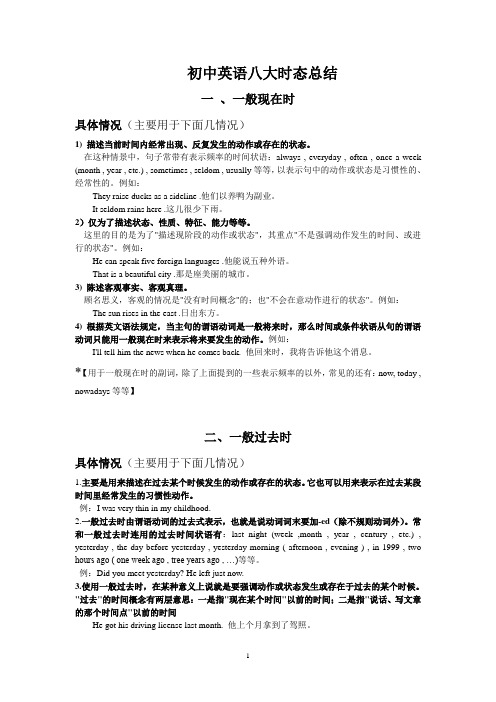初中英语语法八大时态总结完整版初中英语时态总结
初中英语语法八大时态总结(完整版)

初中英语语法八大时态总结(完整版)The eight tenses in middle school English grammar: Simple Present XXX1.StructureAffirmative sentence: Subject + verb base form/verb third person singular + othersNegative sentence: Subject + (auxiliary verb) don't/doesn't + verb base form + othersInterrogative sentence: Do/Does + subject + verb base form + othersShort answer: (Affirmative) Yes。
subject + do/does (Negative) No。
subject + do/does notns: don't = do not。
doesn't = does notXXX: XXX in summer。
I usually leave home for school at 7 every morning.age1) It is used to express XXX existence。
often used with adverbs that indicate frequency。
Common frequency adverbs include: always。
often。
usually。
seldom。
never。
sometimes。
every week (day。
year。
month…)。
once a week。
on Sundays。
Frequency adverbs are usually placed before the n verb。
初中八大时态总结

初中八大时态总结
初中英语的八大时态总结如下:
1. 一般现在时:表示现在的状态、经常性的动作或一般性的事实。
结构为“主语+be/动词原形”。
2. 现在进行时:表示现在正在进行的动作或发生的情境。
结构为“主语+be 动词+动词ing”。
3. 现在完成时:表示已经完成的动作或存在的状态,对现在仍有影响。
结构为“主语+have/has+过去分词”。
4. 现在完成进行时:表示过去开始,一直持续到现在的动作或状态,并且现在仍在进行中。
结构为“主语+have/has been+动词ing”。
5. 一般过去时:表示过去某个时间发生的动作或存在的状态。
结构为“主语+动词过去式”。
6. 过去进行时:表示过去某一时刻正在进行的动作。
结构为“主语
+was/were+动词ing”。
7. 过去完成时:表示过去的某个时间之前已经完成的动作。
结构为“主语+had+过去分词”。
8. 过去完成进行时:表示过去的某个时间之前已经开始,并且一直持续到那个时间的动作。
结构为“主语+had been+动词ing”。
以上是初中英语八大时态的总结,希望对你有所帮助。
初中英语8个时态归纳总结

初中英语8个时态归纳总结英语中的时态是指表示动作或状态发生的时间的一种形式。
在初中阶段,学生需要掌握8个基本的时态,包括一般现在时、一般过去时、一般将来时、现在进行时、过去进行时、将来进行时、现在完成时和过去完成时。
以下是对这8个时态的归纳总结:一、一般现在时(Simple Present Tense)1. 表示经常性、习惯性的动作或状态:- I play basketball every Saturday.- She always brushes her teeth before going to bed.- They live in New York.2. 表示客观事实、真理或科学性常识:- Water boils at 100 degrees Celsius.- The sun rises in the east.- Cats are mammals.二、一般过去时(Simple Past Tense)1. 表示过去某个时间发生的动作或状态:- I finished my homework yesterday.- They visited their grandparents last summer.- She didn't go to the party.2. 表示过去的经历或习惯:- When I was young, I often went swimming. - He always ate breakfast at 8 o'clock.三、一般将来时(Simple Future Tense)1. 表示将来要发生的动作或事件:- I will go shopping tomorrow.- They are going to have a picnic next week. - She won't be late for the meeting.2. 表示将来的打算或意愿:- I am going to be a doctor when I grow up.- We will help you with your project.四、现在进行时(Present Continuous Tense)1. 表示现在正在进行的动作:- We are studying English at the moment.- He is playing soccer with his friends.- They aren't watching TV right now.2. 表示现阶段的趋势或变化:- The population is increasing rapidly.- More and more people are using smartphones.五、过去进行时(Past Continuous Tense)1. 表示过去某一时间段内正在进行的动作:- I was reading a book when the phone rang.- They were cooking dinner at 7 o'clock.2. 表示过去的同时发生的两个动作:- She was listening to music while doing her homework.六、将来进行时(Future Continuous Tense)1. 表示将来某一时间段内正在进行的动作:- Tomorrow, they will be flying to Paris.- I will be waiting for you at the station.2. 表示将来的预测或计划:- This time next month, I will be studying for my exams.七、现在完成时(Present Perfect Tense)1. 表示过去某一时间发生的动作对现在造成的影响或结果: - I have finished my homework, so I can watch TV now.- She has already eaten lunch.2. 表示过去某一时间内多次发生的动作:- We have visited that museum several times.八、过去完成时(Past Perfect Tense)1. 表示过去某一时间点之前已经完成的动作:- By the time they arrived, we had already left.- I had finished my work before the deadline.2. 表示过去的顺序或先后关系:- She realized that she had forgotten her keys after she locked the door.以上是初中英语的8个时态的归纳总结。
(完整版)英语常用的八种时态

(完整版)英语常⽤的⼋种时态英语时态初中阶段应掌握的时态共有⼋种,即⼀般现在时,⼀般将来时,⼀般过去时,现在进⾏时,过去进⾏时,过去将来时,现在完成时,过去完成时。
现从结构,作⽤,时间状语三⽅⾯加以介绍。
●动词形式分五种:1.动词原形→ 2.第三⼈称单数→ 3.过去式→ 4.过去分词→ 5.现在分词⼀、⼀般现在时其结构为:be动词肯定句主语+am,is,are+其它。
否定句主语+am,is,are + not+其它。
⼀般疑问句 Am,Is,Are+主语+其它?特殊疑问句特殊疑问词+am,is,are+主语+其它?实意动词1)主语为第⼀,⼆⼈称及第三⼈称复数时肯定句主语+动词原形+其它。
否定句主语+don't+动词原形+其它。
⼀般疑问句 Do +主语+动词原形+其它?特殊疑问句特殊疑问词+do+主语+动词原形+其它?2)主语为第三⼈称单数时肯定句主语+动词第三⼈称单数 +其它。
否定句主语+doesn't+动词原形+其它。
⼀般疑问句 Does+主语+动词原形+其它?特殊疑问句特殊疑问词+does+主语+动词原形+其它?其作⽤为:表⽰习惯性,经常性的动作;表⽰现在的状态与特征;表⽰普遍真理其常⽤时间状语为often,always,usually,sometimes,everyday(week,year...), in the morning(afternoon,evening)等。
Ex . 1. _______ she _______ (go)to the library every Sunday?此题为习惯性动作,答案为Does,go.2.They often _______(swim)in summer.此题为经常性动作,答案为swim.3.______(be)everyone here?此题表⽰现在的状态,答案为Is.4.The earth______(travel) round the sun.此题表⽰普遍真理,答案为travels.⼆、⼀般过去时其结构为:be动词肯定句主语+was,were+其它。
初中八大时态英语总结

初中八大时态英语总结英语学习中,时态是非常重要的一个环节。
在初中阶段,我们需要掌握八大时态,它们分别是:一般现在时、一般过去时、一般将来时、现在进行时、过去进行时、将来进行时、现在完成时和过去完成时。
本文将对这八大时态进行详细总结,帮助大家更好地理解和运用。
一、一般现在时一般现在时表示经常发生的动作或存在的状态。
构成是:动词原形(或三单形式)。
例句:I go to school every day.(我每天去上学。
)二、一般过去时一般过去时表示过去某个时间发生的动作或存在的状态。
构成是:动词过去式。
例句:He visited his grandparents last weekend.(他上周末拜访了他的祖父母。
)三、一般将来时一般将来时表示将来要发生的动作或存在的状态。
构成是:will + 动词原形。
例句:We will have a sports meeting next week.(我们下周将举行运动会。
)四、现在进行时现在进行时表示正在进行的动作。
构成是:am/is/are + 动词现在分词。
例句:She is watching TV now.(她现在正在看电视。
)五、过去进行时过去进行时表示过去某个时间正在进行的动作。
构成是:was/were + 动词现在分词。
例句:They were playing football at 4 p.m.yesterday.(昨天下午4点他们正在踢足球。
)六、将来进行时将来进行时表示将来某个时间正在进行的动作。
构成是:will be + 动词现在分词。
例句:We will be having a meeting at that time tomorrow.(明天那个时候我们将在开会。
)七、现在完成时现在完成时表示过去发生的动作对现在造成的影响或结果。
构成是:have/has + 动词过去分词。
例句:I have finished my homework.(我已经完成了我的家庭作业。
(完整版)初中英语八大时态总结

初中英语八大时态总结一、一般现在时具体情况(主要用于下面几情况)1) 描述当前时间内经常出现、反复发生的动作或存在的状态。
在这种情景中,句子常带有表示频率的时间状语:always , everyday , often , once a week (month , year , etc.) , sometimes , seldom , usually等等,以表示句中的动作或状态是习惯性的、经常性的。
例如:They raise ducks as a sideline .他们以养鸭为副业。
It seldom rains here .这儿很少下雨。
2)仅为了描述状态、性质、特征、能力等等。
这里的目的是为了"描述现阶段的动作或状态",其重点"不是强调动作发生的时间、或进行的状态"。
例如:He can speak five foreign languages .他能说五种外语。
That is a beautiful city .那是座美丽的城市。
3) 陈述客观事实、客观真理。
顾名思义,客观的情况是"没有时间概念"的;也"不会在意动作进行的状态"。
例如:The sun rises in the east .日出东方。
4) 根据英文语法规定,当主句的谓语动词是一般将来时,那么时间或条件状语从句的谓语动词只能用一般现在时来表示将来要发生的动作。
例如:I'll tell him the news when he comes back. 他回来时,我将告诉他这个消息。
*【用于一般现在时的副词,除了上面提到的一些表示频率的以外,常见的还有:now, today , nowadays等等】二、一般过去时具体情况(主要用于下面几情况)1.主要是用来描述在过去某个时候发生的动作或存在的状态。
它也可以用来表示在过去某段时间里经常发生的习惯性动作。
初中英语语法八大时态概述
初中英语语法八大时态概述一、一般现在时 (Simple Present Tense)一般现在时用于描述常规性的行为、事实或真理。
常见的时间状语有:always(总是)、usually(通常)、often(经常)、sometimes(有时候)、never(永不)等。
例句:- I always go to school by bus.- She usually eats breakfast at home.- They often play football on weekends.- He sometimes helps his mother with the housework.- Cats never like water.二、一般过去时 (Simple Past Tense)一般过去时用于描述过去发生的事情或存在的状态。
常见的时间状语有:yesterday(昨天)、last week(上周)、two hours ago (两小时前)等。
例句:- I visited my grandparents yesterday.- She bought a new dress last week.- They watched a movie two hours ago.三、一般将来时 (Simple Future Tense)一般将来时用于描述将来要发生的事情或存在的状态。
常见的时间状语有:tomorrow(明天)、next month(下个月)、in a week(一周后)等。
例句:- I will go shopping tomorrow.- She is going to visit her friend next month.- They are going to have a party in a week.四、现在进行时 (Present Continuous Tense)现在进行时用于描述正在进行的动作。
初中英语语法八大时态总结完整版
初中英语语法八大时态总结完整版一、一般现在时1.定义:表示经常性或习惯性的动作、状态或真理。
2.结构:主语+动词原形(+其他成分)。
3.例句:(1) I go to school every day.(2) He often plays basketball after school.(3) Water boils at 100 degrees Celsius.二、一般过去时1.定义:表示过去一些时间发生的动作或存在的状态。
2.结构:主语+动词的过去式(+其他成分)。
3.例句:(1) They visited their grandparents last weekend.(2) She lived in Beijing when she was young.(3) We studied English in middle school.三、一般将来时1.定义:表示将来一些时间将要发生的动作或存在的状态。
2. 结构:主语 + will + 动词原形(+ 其他成分)。
3.例句:(1) I will go to the park tomorrow.(3) We will have a party next week.四、现在进行时1.定义:表示现在正在进行的动作。
2. 结构:主语 + am/is/are + 动词-ing(+ 其他成分)。
3.例句:(1) She is reading a book right now.(2) They are playing soccer in the park.(3) We are having dinner at the moment.五、过去进行时1.定义:表示过去一些时间正在进行的动作。
2. 结构:主语 + was/were + 动词-ing(+ 其他成分)。
3.例句:(1) He was watching TV at 8 o'clock last night.(2) They were traveling in Europe during summer vacation.(3) We were studying when the phone rang.六、将来进行时1.定义:表示将来一些时间正在进行的动作。
(中考英语资料)初中英语语法八大时态总结(完整版)含答案
初中英语语法八大时态一.一般现在时1. 结构肯定句式: 主语+动词原形/动词的第三人称单数+其他否定句式: 主语+(助动词)don't/doesn't +动词原形+其他一般疑问句式: Do/Does+主语+动词原形+其他简略回答: (肯)Yes,主语+do/does (否)No,主语+do/does not缩写形式: don't = do not doesn't = does not例句:He often goes swimming in summer.I usually leave home for school at 7 every morning.2.用法1)表示经常的、习惯性的动作或存在的状态,常与表示频度的副词连用。
常用的频度副词有:always、often、usually、seldom、never、sometimes, every week (day, year, month…), once a week, on Sundays.频度副词在句中通常放在行为动词之前,系动词、助动词之后。
例如: He often goes swimming in summer.I usually leave home for school at 7 every morning.2)表示主语具备的性格、特征和能力等。
例如:All my family love football .My sister is always ready to help others .Ann writes good English but does not speak well.3)表示客观真理、客观存在、自然现象。
例如:The earth moves around the sun. Shanghai lies in the east of China.4)表示按计划或安排好的,或将要发生的动作,可用一般现在时表将来。
初中英语语法八大时态总结
初中英语语法八大时态总结一、一般现在时态(Simple Present)1.表示现在经常性、习惯性的动作或状态:- Lucy goes to school by bus every day.- They often play basketball in the park.2.表示客观事实或普遍真理:- The sun rises in the east.- Water boils at 100 degrees Celsius.3.表示评论、观点等:- I think it's a good idea.- He doesn't like swimming.二、一般过去时态(Simple Past)1.表示过去一些时间发生的动作或状态:- They visited their grandparents last weekend.- I lived in London for two years.2.表示过去的经常性动作或状态:- We often played soccer after school.- She worked in a restaurant when she was a student.3.表示与现在相反的情况或假设:- If I had money, I would buy a new car.- I wish I could go to the concert with you.三、一般将来时态(Simple Future)1.表示将来要发生的事情:- I will meet him at the airport tomorrow.- They are going to have a party next week.2.表示意愿、打算或承诺:- I promise I will help you.- She is going to study abroad next year.四、现在进行时态(Present Continuous)1.表示现在正在进行或暂时的动作:- They are playing football in the park.- He is studying for the exam.2.表示现阶段的变化或趋势:- The population of the city is increasing rapidly.- More and more people are using smartphones.五、过去进行时态(Past Continuous)1.表示过去一些时间正在进行中的动作:- I was watching TV when she called me.- They were having dinner when the power went out.2.表示过去一些时间同时发生的两个动作:- While he was reading, his sister was playing the piano.- When I arrived, they were still waiting for you.六、将来进行时态(Future Continuous)1.表示将来一些时间正在进行的动作:- He will be sleeping when you arrive.2.表示将来一些时间同时发生的两个动作:- While you are washing the dishes, I will be cleaning the bathroom.- When I call you, she will be cooking dinner.七、现在完成时态(Present Perfect)1.表示过去发生但对现在有影响的动作或状态:- I have lost my key, so I can't open the door.- She has finished her homework, so she can watch TV now.2.表示经历或遭遇过的事情:- Have you ever been to Paris?- He has never seen such a beautiful sunset.八、过去完成时态(Past Perfect)1.表示在过去一些时间之前已经发生的动作或状态:- When I arrived, they had already left.2.表示过去一些时间之前一直存在或保持的状态:- He had lived in that house for 10 years before he moved out.- She had been planning the party for weeks.。
- 1、下载文档前请自行甄别文档内容的完整性,平台不提供额外的编辑、内容补充、找答案等附加服务。
- 2、"仅部分预览"的文档,不可在线预览部分如存在完整性等问题,可反馈申请退款(可完整预览的文档不适用该条件!)。
- 3、如文档侵犯您的权益,请联系客服反馈,我们会尽快为您处理(人工客服工作时间:9:00-18:30)。
初中英语语法八大时态总结完整版初中英语时态总结初中英语语法八大时态一.一般此刻时1.构造一定句式 : 主 +原形 /的第三人称数 +其余否认句式 : 主 +(助)don't/doesn't +原形 +其余一般疑句式 : Do/Does+主 +原形 +其余略回答 : (肯)Yes,主 +do/does(否 )No,主 +do/does not写形式 : don't = do not doesn't = does not例句: He often goes swimming in summer.I usually leave home for school at 7 every morning.2.用法1)表示常的、性的作或存在的状,常与表示度的副用。
常用的度副有: always、often、 usually、seldom、never、sometimes, every week (day, year, month ⋯), once a week, on Sundays. 度副在句中往常放内行从前,系、助以后。
比如 : He often goes swimming in summer.I usually leave home for school at 7 every morning.2)表示主具的性格、特点和能力等。
比如: All my family love football .My sister is always ready to help others .Ann writes good English but does not speak well.3)表示客真谛、客存在、自然象。
比如: The earth moves around the sun.Shanghai lies in the east of China.4)表示按划或安排好的,或将要生的作,可用一般在表未来。
但只限于 start,begin,leave,go,come,arrive,return,take place等。
比如: The train leaves at six tomorrow morning.He comes back tonight.5)在复合句中,当主句是一般未来,或条件状从句的只好用一般在来表示未来要生的作。
比如:I'll tell him the news when he comes back.If you take the job , they will talk with you in greater details.二.一般过去时态1.构造一定句式 : 主 +去式 +其余否认句式 : 主 +(助) didn ’t +原形 +其余一般疑句式 : Did+ 主 +原形 +其余略回答 : (肯)Yes,主 +did(否)No,主 +did not基本构否认句一般疑句Be was/were+not was/were提早,放于句首行didn’t+do(原形)Did+ 主 +do(原形)2.用法1)表示去某一刻或某一段里所生的作或状况。
常和表示去的状yesterday, just now, the other day, in 1982, ago, an hour ago, long long ago, the day before yesterday, last week(year, night, month ⋯ ), at the age of 5, one day, once upon a等time用比如: Where did you go just now?After a few years, she started to play the piano.2)表示在去,常或频频生的作。
常与often,always等表示度的副用。
比如: When I was a child, I often played football in the street.我是个孩子的候,常在路上踢足球。
3)一般去式也可与today,this week,this month,this year等表在的状用,但些状指去的,决不包括“ 在”“此此刻”的意思。
比如: Did you see him today?今日你看他了?三.一般未来时1.构造构 1:一定句式:主 +助 will+ 原形 +其余否认句式:主 +助 will+ 原形 +not+其余一般疑句式:助Will+ 主 +原形 +其余回答:在口中,will 在名或代后常’,llwii not 常 won’t。
在疑句中,主第一人称(I 和 we),常用助shall。
比如: She’ll go to play basketball.Shall we go to the zoo?构 2:一定句式:主 +be going to +原形 +其余否认句式:主 +be not going to +原形 +其余一般疑句式: Be+主 +going to+原形 +其余略回答:(肯) Yes,主 +be(否)No,主+be not2. 用法1)表示未来某个要生的作或存在的状,常与tomorrow, next day(week, month, year ⋯ ), soon, in a few minutes, by⋯, the day after tomorrow等用。
比如: I'll meet you at the school gate tomorrow morning.2)、表示人于未来的见解、假和推,往常用于be afraid, be/feel sure, hope, know, think等后边的从句或与副词perhaps,possibly,maybe等连用。
比如: I think she’ll go back home for supper.Maybe she ’ ll go to the gym.未来时其余表示法1)be going to表示未来表示说话人的打算、计划、安排或依据迹象判断必定或很可能发生的事情。
比如: What are you going to do tomorrow?The play is going to be produced next month。
注意: be going to 和 will 之间的差别。
在时间上:be going to 往常表示立刻要发生或相当快就要发生的事情;而will 不指明任何详细时间,能够指遥远的未来。
He is going to be better.He will be better.计划 /暂时:二者都表表示图时, be going to 含有早先计划、准备的意思; will 则指未经过早先思虑或计划,是暂时的一种决定。
— What are you going to do next Sunday?— I'm going to go fishing.— Where is the telephone book?— I'll go and get it for you.二者都用于展望时, be going to 意指有迹象表示某件事将要发生,属客观的推断;will则意指说话人以为 /相信某件事将要发生,属主观的推断。
在条件状语从句中, be going to 表未来 ,will 表意向。
比如: If you are going to make a journey, you'd better get ready for it as soon as possible.Miss Gao will tell you the answer if you ask her.2)“ beto+动词原形”表示客观安排或受人指示而将要做某事。
比如: We are to discuss the report next Saturday.3)be about to +动词原形,意为立刻做某事。
不可以与tomorrow, next week 等表示明确未来时的时间状语连用,多于when 指引的时间状语连用。
比如: He is about to leave for Beijing.四.此刻进行时1.构造:am/is/are+动词的此刻分词2.用法:1)表示此刻(指说话人说话时)正在发生或进行的动作。
常与 now, right now, at this moment, at thislook 、listen 等,主句的动词也与此刻time, these days等时间状语连用。
注:假如句首有警告性动词进行时连用。
比如: We are waiting for you now.Listen! The bird is singing in the tree.2).表示现阶段(说话前后一段时间内),向来在进行的活动。
说话时动作未必正在进行。
比如: Mr. Green is writing another novel. 他在写另一部小说。
(说话时并未在写,只处于写作的状态。
)He is thinking about this problem.这些天来他向来在考虑这个问题。
3).表示频频发生的动作或连续存在的状态,常与always, constantly, forever等词连用,常常带有说话人的主观色彩。
比如: You are always changing your mind.4).表示还没有达成的渐变过程,这样的动词有:get, grow, become, turn, run, go, begin等。
比如: The leaves are turning red.It's getting warmer and warmer.5)、表示移位的动词,如go,come,leave,start,arrive等,其此刻进行时可表未来。
比如: I'm leaving tomorrow. 明日我要走了。
The train is arriving soon. 火车要到了。
注:不可以用进行时态的动词类型举例感官类See,look,smell,hear,taste,notice,feel感觉类Love,agree,like,hate,want,fear,wish,prefer认知类Believe,think,understand,forget,remember存在类Appear,exist,lie,remain据有、附属类Have,own,contain,belong,possess,consist of短暂动作类Accept,receive,admit,decide,promise,give,finish五.此刻达成时1.构造:一定句:主语 +助动词 have(has)+动词过去分词 -ed否认句:主语 +助动词 have(has)+not(haven ’ t,hasn动’词t)+过去分词 -ed一般疑问句: Have(Has)+ 主语 +动词过去分词 -ed+?特别疑问句:疑问词 +have(has)+ 主语 +动词过去分词 -ed+?2.用法含义:此刻达成时用来表示此刻从前已发生或达成的动作或状态,但其结果却和此刻有联系 , 也就是说 , 动作或状态发生在过去但它的影响此刻还存在。
